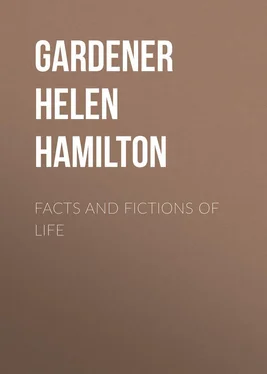Helen Gardener - Facts and Fictions of Life
Здесь есть возможность читать онлайн «Helen Gardener - Facts and Fictions of Life» — ознакомительный отрывок электронной книги совершенно бесплатно, а после прочтения отрывка купить полную версию. В некоторых случаях можно слушать аудио, скачать через торрент в формате fb2 и присутствует краткое содержание. Жанр: foreign_antique, foreign_prose, на английском языке. Описание произведения, (предисловие) а так же отзывы посетителей доступны на портале библиотеки ЛибКат.
- Название:Facts and Fictions of Life
- Автор:
- Жанр:
- Год:неизвестен
- ISBN:нет данных
- Рейтинг книги:4 / 5. Голосов: 1
-
Избранное:Добавить в избранное
- Отзывы:
-
Ваша оценка:
- 80
- 1
- 2
- 3
- 4
- 5
Facts and Fictions of Life: краткое содержание, описание и аннотация
Предлагаем к чтению аннотацию, описание, краткое содержание или предисловие (зависит от того, что написал сам автор книги «Facts and Fictions of Life»). Если вы не нашли необходимую информацию о книге — напишите в комментариях, мы постараемся отыскать её.
Facts and Fictions of Life — читать онлайн ознакомительный отрывок
Ниже представлен текст книги, разбитый по страницам. Система сохранения места последней прочитанной страницы, позволяет с удобством читать онлайн бесплатно книгу «Facts and Fictions of Life», без необходимости каждый раз заново искать на чём Вы остановились. Поставьте закладку, и сможете в любой момент перейти на страницу, на которой закончили чтение.
Интервал:
Закладка:
Perhaps you will ask: "Why did he not take the warning, and follow a better course, turn the other way?"
Perchance it might be asked on the other hand – since court, and morgue, and cemetery officials unite in the assertion that the above record is almost universal, and that our present methods not only do not reform, but actually prevent the reform of offenders – why this system is still followed by the State, and if the warning has not been ample and severe here, also.
Are we to expect greater wisdom, more far-seeing judgment and a loftier aim in these unfortunates of society than is developed in those who control them?
Since it is all such a dismal failure, why not plan a better way? Why not begin at the other end of the line to keep offenders apart? Why herd them – good, bad, and indifferent – together, in the stage of their career when there is hope for some, at least, to reform; and begin to separate them only when the last mile of the road is reached?
Why, if the city must bury its dead in trenches and under the conditions only half described above (because much of it is too sickening to present), why, if cremation or some better mode of burial is not possible – and certainly I think it is – why, at least, need the awful, the ghastly, the inhuman combination be made of burying together medium term criminals, imbeciles, lunatics, and thousands of corpses all on one mere scrap of land? If a seven-foot mass of corruption exhaling through the air and percolating through land and water must be devoted to the dead poor of a great city, why in the name of all that is civilized or humane, permit any living thing to be detained and poisoned on the same bit of earth?
I saw a woman who had come to visit her mother who was one of these poor, insane creatures. "I can't afford to keep her at home," she said, "and then at times she gets 'snags' and acts so that people are afraid of her, so I had to let her come here. It is kind of awful, ain't it?"
I thought it was "kind of awful," for more reasons than the poor woman could realize, for she was so used to foul air and knew so little of sanitary conditions that she was mercifully spared certain thoughts that seem to have escaped the authorities also.
"It is her birthday and I brought her this," she said, showing me a colored cookie. "She will like it. We can visit here one day each month if we have friends."
"How many bodies do you carry each week?" I asked of the captain of the city boat.
"About fifty," he said. But later on both he and the official on the Island told me that there were six thousand buried here yearly, so it will be seen that his estimate per week was less than half what it should have been.
I looked at the stack of pine boxes, the ends of which showed from beneath a tarpaulin on the deck.
They were stacked five deep. There were seven wee ones, hardly larger than would be filled by a good-sized kitten.
I said: "They are so very small. I don't see how a baby was put inside."
The man to whom I spoke – a deck hand who was a "ten-day-self-committed," so the captain told me later – smiled a grim, sly smile and said:
"I reckon you're allowin' fer trimmin's. This kind don't get piliers and satin linin's. It don't take much room for a baby with no trimmin's an' mighty little clothes."
"Why are two of them dark wood and all the rest light?" I asked of the same man.
"I reckon the folks of them two had a few cents to pay fergittin' their baby's box stained. It kind of looks nicer to them, and when they get a little more money, they'll come and get it dug up and put it in a grave by itself or some other place. It seems kind of awful to some folks to have their little baby put in amongst such a lot."
He said it all quite simply, quite apologetically, as if I might think it rather unreasonable – this feeling that it was "kind of awful to think of the baby in amongst such a lot."
At that time, I did not know that he was a prisoner. He showed me a number of things about the boxes and spoke of the open cracks and knot holes through which one could see what was inside. I declined to look after the first glance.
"You don't mind it very much after you're used to it," he said. "Of course, you would, but I mean us ."
I began to understand that he was a prisoner.
"When you're a prisoner, you get used to a good deal," he said, later on, when they were unloading the bodies and some of the men looked white and sick. "They're new to it," he explained to me. "It makes them sick and scared; but it won't after a while."
"Why are most of them here?" I asked. "Most of them look honest – and – "
"Honest!" he exclaimed, with the first show he had made of rebellion or resentment. "Honest! Of course most of us are honest. It is liquor does it mostly. None of us are thieves – yet!"
I noticed the "us," but still evaded putting him in with the rest.
"Why do they not let liquor alone, after such a hard lesson?"
He laughed. He had a red, bloated, but not a bad face. He was an Englishman.
"Some of us can't. Some don't want to, and some – some – it is about all some can get."
Later on, I was told that this man was honest, a good worker, and that he was "self-committed to get the liquor out of him. He's been here before. When he gets out, he will be drunk before he gets three blocks away from the dock, and he'll be sent here again – or to the Island!"
"And has this system gone on for a hundred years," I asked, "without finding some remedy?"
"Well, since the women began to take a hand, some little has been done," the officer replied. "They built a coffee and lodging house right near the landing, and take returning prisoners there, and give them a chance to work if they want to – in a broom factory they built. Some get a start that way and if they work and are honest, they get a letter saying so when they find places. It is only a drop in the bucket, but it helps a few."
"It looks a little as though, if women were to take a hand in public, municipal, or governmental affairs, that reform, and not punishment, might be made the object of imprisonment if imprisonment became necessary, doesn't it?"
He laughed.
"Politics is no place for women. This they are doing is charity. That is all very well, but they got no business meddling with city government, and courts, and prisoners only as charity."
"Yet you say that, for a hundred years, those who look after the criminal population, thought very little of helping the men who came out, much less did they think of beginning at the other end and trying to keep them from going in. Women have been allowed to devise public charities, even, for only a few years past. They had no experience in building manufactories and conducting coffee and lodging houses; they have but little money of their own to put into such things and yet they have bethought them to start, in embryo, right here where the returning convict lands, what appears to have vast possibilities as you say. Now if this effort for the prevention of crime and want were at the other end of the line in municipal government, don't you think it might go even nearer the root of the matter and do more good?"
"How would you like to be a ward politician and a heeler?" he inquired, wiping a smile away and looking at my gloves.
"I should not like it at all."
"Well, now, look at that! Of course no lady would, so – "
"Do you think it possible that the world might get on fairly comfortably without having 'heelers' and 'ward politicians' – in the sense you mean – in municipal or state government? And that it might be better without such crime producers?" I added, as he began to laugh.
"You women are always visionary. Never practical. You – "
Читать дальшеИнтервал:
Закладка:
Похожие книги на «Facts and Fictions of Life»
Представляем Вашему вниманию похожие книги на «Facts and Fictions of Life» списком для выбора. Мы отобрали схожую по названию и смыслу литературу в надежде предоставить читателям больше вариантов отыскать новые, интересные, ещё непрочитанные произведения.
Обсуждение, отзывы о книге «Facts and Fictions of Life» и просто собственные мнения читателей. Оставьте ваши комментарии, напишите, что Вы думаете о произведении, его смысле или главных героях. Укажите что конкретно понравилось, а что нет, и почему Вы так считаете.












![John Bruce - The Lettsomian Lectures on Diseases and Disorders of the Heart and Arteries in Middle and Advanced Life [1900-1901]](/books/749387/john-bruce-the-lettsomian-lectures-on-diseases-and-disorders-of-the-heart-and-arteries-in-middle-and-advanced-life-1900-1901-thumb.webp)